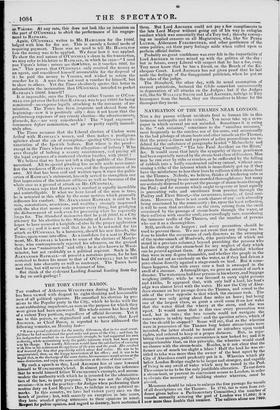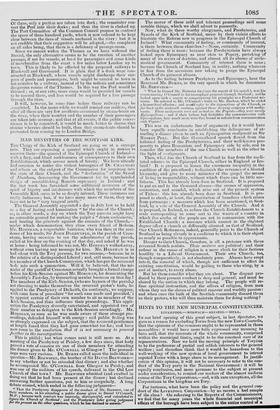NAVIGATION OF THE THAMES NEAR LONDON.
NOT a day passes without accidents fatal to human life in this immense metropolis and its vicinity. You never take up a news-
paper in which several are not recorded. Sometimes it is owing to the " cab nuisance," sometimes to the "omnibus nuisance," most frequently to the careless use of fire-arms, and occasionally to the bad pilotage of steam-boats and other vessels on the Thames, that the penny-a-liners and reporters of police proceedings are in- debted for the substance of paragraphs headed " Melancholy and Distressing Casualty," "The late Fatal Accident on the River," &c. It would seem that lately the sympathy of these gentlemen had been especially moved by the steam-boat class of disasters. Men may be run over by cabs or coaches, or be suffocated by the falling of rubbish into a badly-constructed railway-tunnel, without occa- sioning a tithe of the interest which is immediately got up if they have the misfortune to lose their lives by collision with a steam-boat on the Thames. Nobody, we believe, thinks of hindering cabs or coaches from plying in our most crowded thoroughfares; but many are seriously disposed to prevent the passage of steam-boats through the Pool ; and for reasons which ought to operate at least equally in preventing cabs and omnibuses from passing through the Poultry and Fleet Street,—the occurrence, namely, of fatal acci- dents. However, them is not much chance of any such absurdity being sanctioned by the community ; for, upon the least reflection, it will be seen that accidents on the river, arising from the swell occasioned by the passage of steam-boats through the water, or their collision with smaller craft, are exceedingly rare, considering the immense traffic of the Thames, and the number of persons who use it as a thoroughfare.
Still, accidents do happen ; and every precaution should be used to prevent them. We are not aware that any thing can be done to hinder the occurrence of such disasters as the swamping of the oyster-smack off Woolwich, (the particulars of which are stated in a previous column,) beyond punishing the persons who lied the charge of the steam-boat for any neglect of duty which can be proved against them. At present it is doubtful whether they were in any degree blameable, and whether the people in the boat did not act as carelessly on the water, as if they had driven a pony-chaise directly against a stage-coach on land. But it some- times happens, that with every care a boat is swamped in the swell of a steamer. A fortnight ago, we gave an account of such a disaster. The Waterman had four persons in his wherry, and luggage weighing 2001bs; while he was licensed to carry eight persons and 4481bs. It appeared that, with only half a load, his boars edge was almost level with the water. He saw the City of Aber- deen steamer on her passage down the Thames, and rowed to the side of the river opposite to that which the steamer took. The steamer was only going about four miles an hour; but being one of the largest class, so great a swell came from her wake that the water filled the wherry at the stern, and she was upset. It would seem that in this case every precaution was used, but in vain ; the two vessels could not navigate the same waters in safety together: and the question arises, whichof the two should be stopped? Some will say, that as the wherries were in possession of the Thames long before steam-boats were invented, the latter should be treated as intruders upon vested rights, and ordered to keep at a proper distance. But, in regu- lating these matters, public convenience is now looked to; and it is unquestionable that, on this principle, the wherries would stand no chance with the steam-boats. Besides, is it not clear that the former are of much too slight a fabric ? Half the load he was en- titled to take was more than the owner of the boat upset by the City of Aberdeen could prudently put in it. Wherries winch ply below London Bridge ought to be larger and stronger, and capable of living in any swell of water which may be raised in the Pool. This seems to us to be the only justifiable alteration. To cut down a steam-boat, or prevent its convenient access to London, in order to obviate the necessity of building stouter wherries, must be abs it rd. Measures should be taken to enlarge the free passage for vessels of all descriptions on the Thames. In 1792, (as is seen from evi- dence given before a Parliamentary Committee,) the number of vessels annually entering the port of London was 11,000; it is now more than double that number. The colliers alone are 7000. Of these, only a portion are taken into dock ; the remainder con- vert the Pool into their docks; and thus the river is choked up. The Port Committee of the Common Council propose to contract the space of three hundred yards, which is now ordered to be kept clear between the tiers of vessels anchored in the river : but it is not credible that their suggestion will be adopted,—the complaint on all sides being, that there is a deficiency of passage-room. Since we cannot widen the Thames as we have widened the .Strand, the only alternative seems to be the creation of another passage, if not for vessels, at least for passengers and some kinds of merchandise from the coast a few miles below London up to town. This is likely to be effected by the proposed railways to Blacke all and Gravesend. It is plain that if a dock were con- structed at Blackwell, where vessels might discharge their car- goes of goods and passengers, both might be carried to town in ten minutes by a railway, instead of by the tedious and sometimes dangerous course of the Thames. In this way the Pool would be thinned ; or, at any rates more room would be provided for vessels to be moored there, and less would be required for a free passage through the tiers.
It will, however, be some time before these railways can be completed. In the mean while we would remind our readers, that after all there are very few accidents occasioned by steam-boats on the river, when their number and the number of their passengers are taken into account; and that at all events, if the public conve- nience is to be consulted, it would be much better to decree that stouter wherries should be built, than that steam-boats should be prevented from coming up to London Bridge.



























 Previous page
Previous page